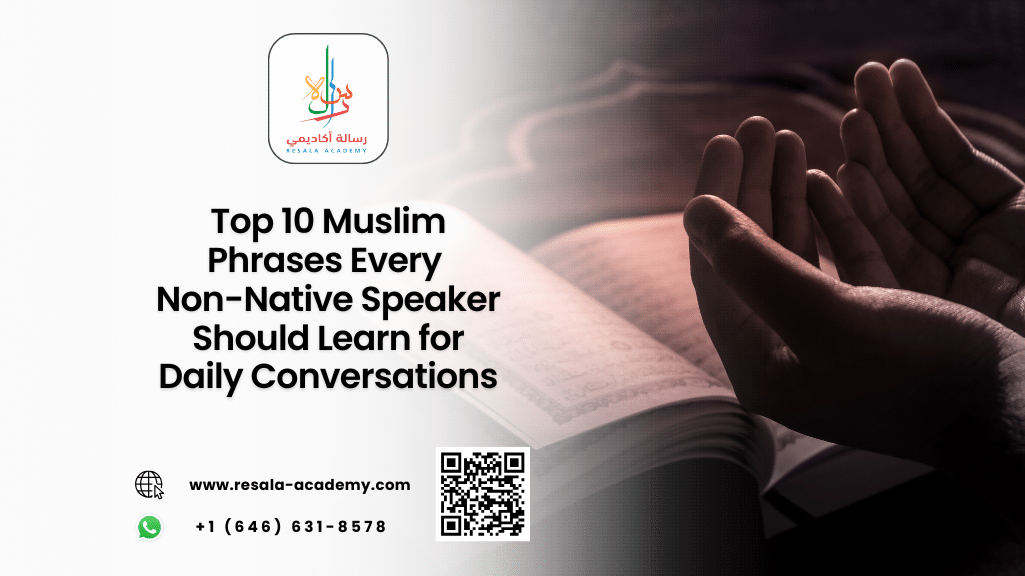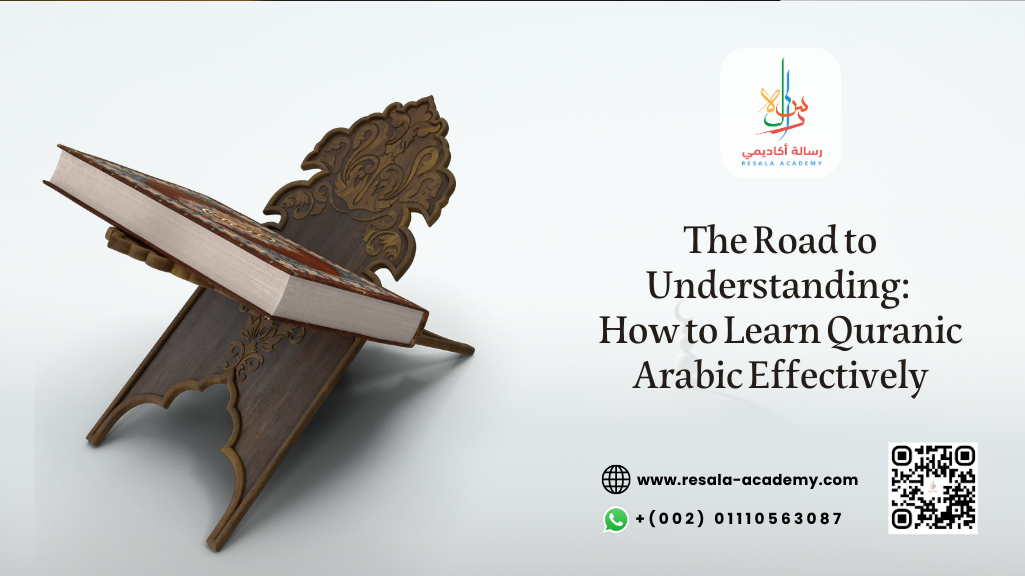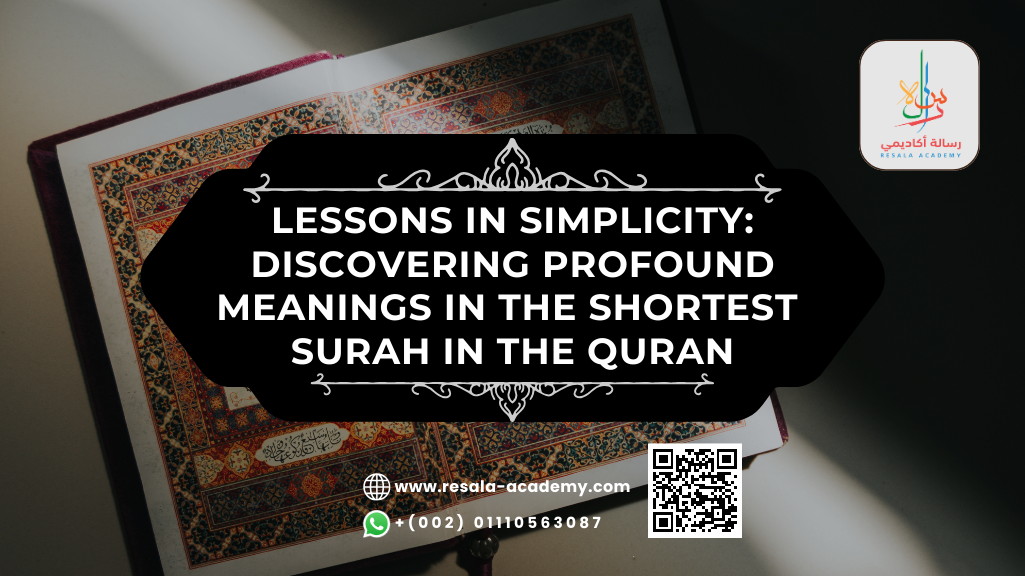Table of Contents
Top 10 Muslim Phrases Every Non-Native Speaker Should Learn for Daily Conversations
Learning a new language is a gateway to understanding a culture, and when it comes to Arabic and Islamic studies, mastering essential expressions can be transformative. Whether you’re a traveler, a student of the Quran, or simply intrigued by Islamic culture, familiarizing yourself with common Muslim phrases is a powerful step toward meaningful communication and spiritual growth.
In this comprehensive guide, we’ll explore the top 10 Muslim phrases every non-native speaker should learn. These expressions are deeply rooted in Islamic tradition, often derived from the Quran and Hadith, and are used in daily conversations by millions of Muslims around the world.
Throughout this article, we’ll also highlight how Resala Academy serves as a beacon for non-native speakers seeking to master Arabic and Quranic studies online.
Why Learn Muslim Phrases?
Understanding Muslim phrases and meanings is not just about language—it’s about connecting with a rich spiritual and cultural heritage. These expressions are used in greetings, prayers, gratitude, and everyday interactions. Learning them helps:
- Deepen your understanding of Islamic values.
- Enhance your Quranic studies.
- Build rapport with native Arabic speakers.
- Participate respectfully in Muslim communities.
Top 10 Muslim Phrases for Daily Use
Below are the most popular Muslim phrases that non-native speakers should know. Each phrase includes its Arabic script, pronunciation, meaning, and context of use.
1. السَّلَامُ عَلَيْكُمْ (As-Salāmu ʿAlaykum)
Meaning: Peace be upon you
Usage: Universal Islamic greeting
This is the most common greeting among Muslims. The appropriate response is:
وَعَلَيْكُمُ السَّلَامُ (Wa ʿAlaykum As-Salām) – “And peace be upon you too.”
Quran Reference:
فَإِذَا دَخَلْتُم بُيُوتًۭا فَسَلِّمُوا۟ عَلَىٰٓ أَنفُسِكُمْ تَحِيَّةًۭ مِّنْ عِندِ ٱللَّهِ مُبَـٰرَكَةًۭ طَيِّبَةًۭ ۚ
“However, when you enter houses, greet one another with a greeting ˹of peace˺ from Allah, blessed and good.”
— Surah An-Nur 24:61
2. إِنْ شَاءَ ٱللَّٰهُ (In shāʾ Allāh)
Meaning: If Allah wills
Usage: Used when speaking about future intentions or events
This phrase reflects a Muslim’s belief in divine will.
Quran Reference:
وَلَا تَقُولَنَّ لِشَيْءٍ إِنِّي فَاعِلٌ ذَٰلِكَ غَدًا * إِلَّا أَن يَشَاءَ ٱللَّهُ
“And never say of anything, ‘Indeed, I will do that tomorrow,’ except [when adding], ‘If Allah wills.’”
— Surah Al-Kahf 18:23-24
3. مَا شَاءَ ٱللَّٰهُ (Mā shāʾ Allāh)
Meaning: What Allah has willed
Usage: Express admiration or appreciation
Often said when seeing something beautiful or impressive, to avoid envy.
Quran Reference:
وَلَوْلَآ إِذْ دَخَلْتَ جَنَّتَكَ قُلْتَ مَا شَآءَ ٱللَّهُ
“If only you had said, upon entering your property, ‘This is what Allah has willed!”
— Surah Al-Kahf 18:39
4. جَزَاكَ ٱللَّٰهُ خَيْرًا (Jazāk Allāhu Khayran)
Meaning: May Allah reward you with goodness
Usage: A way to thank someone sincerely
Instead of just saying “thank you,” this phrase adds a spiritual dimension.
Hadith Reference:
The Prophet (ﷺ) said:
مَنْ صُنِعَ إِلَيْهِ مَعْرُوفٌ فَقَالَ لِفَاعِلِهِ جَزَاكَ اللَّهُ خَيْرًا فَقَدْ أَبْلَغَ فِي الثَّنَاءِ
“Whoever some good was done to him, and he says: ‘May Allah reward you in goodness’ then he has done the most that he can of praise.”
— Jami` at-Tirmidhi 2035
5. أَسْتَغْفِرُ ٱللَّٰهَ (Astaghfirullāh)
Meaning: I seek forgiveness from Allah
Usage: Used when repenting or after making a mistake
This phrase is a form of dhikr (remembrance of Allah) and repentance.
Quran Reference:
وَأَنِ ٱسْتَغْفِرُوا۟ رَبَّكُمْ ثُمَّ تُوبُوٓا۟ إِلَيْهِ
And seek your Lord’s forgiveness and turn to Him in repentance.
6. سُبْحَانَ ٱللَّٰهُ (Subḥān Allāh)
Meaning: Glory be to Allah
Usage: Express amazement or praise
This phrase is part of the daily tasbih (glorification of Allah).
Hadith Reference:
لأَنْ أَقُولَ سُبْحَانَ اللَّهِ وَالْحَمْدُ لِلَّهِ وَلاَ إِلَهَ إِلاَّ اللَّهُ وَاللَّهُ أَكْبَرُ أَحَبُّ إِلَىَّ مِمَّا طَلَعَتْ عَلَيْهِ الشَّمْسُ
The uttering of (these words):” Exalted is Allah (He is free from imperfection), all praise is due to Allah, there is no god but Allah, and Allah is the Greatest,” is dearer to me than anything over which the sun rises.
— Sahih Muslim 2695
7. اَلْحَمْدُ لِلّٰه (Al-ḥamdu lillāh)
Meaning: All praise is due to Allah
Usage: Express gratitude
Used in response to good news or after completing a task.
Quran Reference:
ٱلْحَمْدُ لِلَّهِ رَبِّ ٱلْعَٰلَمِينَ
“All praise is for Allah—Lord of all worlds”
— Surah Al-Fatiha 1:2
8. اللهُ أَكْبَرُ (Allāhu Akbar)
Meaning: Allah is the Greatest
Usage: Express awe, during prayer, or in difficult situations
This phrase is central to Islamic worship and daily life.
Quran Reference:
﴿وَكَبِّرْهُ تَكْبِيرًا﴾
“And magnify Him with [great] magnification.”
— Surah Al-Isra 17:111
9. لَا إِلٰهَ إِلَّا ٱللَّٰهُ (Lā ilāha illā Allāh)
Meaning: There is no god but Allah
Usage: Core declaration of Islamic faith
This is the first part of the Shahada, the Islamic testimony of faith.
Quran Reference:
فَاعْلَمْ أَنَّهُ لَا إِلَٰهَ إِلَّا ٱللَّهُ
“So, know ˹well, O Prophet,˺ that there is no god ˹worthy of worship˺ except Allah”
— Surah Muhammad 47:19
10. فِي أَمَانِ ٱللَّٰه (Fī Amānillāh)
Meaning: In the protection of Allah
Usage: Farewell expression
This beautiful phrase is used when parting, especially for long journeys.
Read more about: Islamic Religious Words in the Qur’an: A Study Guide for Non-Native Readers
The Power of Learning Arabic Muslim Phrases
Mastering these Arabic Muslim phrases is more than a linguistic achievement—it’s a spiritual journey.
Each phrase carries a profound meaning, often rooted in the Quran or Hadith, and reflects the values of humility, gratitude, and submission to the Divine.
By integrating these expressions into your daily conversations, you not only enhance your Arabic vocabulary but also align your speech with Islamic etiquette.
What Phrase Do Muslims Repeat as an Expression of Shahadah?
The Shahadah, or Islamic declaration of faith, is the cornerstone of a Muslim’s belief system. When exploring what phrase do Muslims repeat as an expression of Shahadah, it’s essential to understand both its linguistic and spiritual significance. This phrase is not only recited during conversion to Islam but also forms a part of daily prayers and spiritual reflection.
Primary Phrase:
- لَا إِلٰهَ إِلَّا ٱللَّٰهُ، مُحَمَّدٌ رَسُولُ ٱللَّٰه
- Lā ilāha illā Allāh, Muḥammadun Rasūl Allāh
- “There is no god but Allah, and Muhammad is the Messenger of Allah.”
Spiritual Significance:
- It affirms monotheism (Tawheed) and the prophethood of Muhammad ﷺ.
- Reciting this phrase with sincerity is the key requirement for embracing Islam.
Usage in Daily Life:
- Repeated during prayers (Salah), Adhan (call to prayer), and moments of reflection.
- Often included in dhikr (remembrance of Allah) sessions and Islamic education.
Quranic Foundation:
- فَاعْلَمْ أَنَّهُ لَا إِلَٰهَ إِلَّا ٱللَّهُ
“So know that there is no deity except Allah.” — Surah Muhammad 47:19
- فَاعْلَمْ أَنَّهُ لَا إِلَٰهَ إِلَّا ٱللَّهُ
Understanding this phrase is vital for anyone studying Arabic Muslim phrases, as it encapsulates the essence of Islamic belief and is foundational to many common Muslim phrases used in worship and daily life.
Deepening Your Understanding of Muslim Phrases Through Contextual Learning
To truly master Muslim phrases, learners must move beyond memorization and engage with the context in which these expressions are used. This approach enhances comprehension and retention, especially for non-native speakers focused on Arabic and Quranic studies.
Contextual Learning Benefits:
- Helps learners understand when and why each phrase is used.
- Encourages emotional and spiritual connection with the language.
- Supports accurate pronunciation and intonation through real-life scenarios.
Examples of Contextual Use:
- “Subḥān Allāh” when witnessing a beautiful sunset or miracle of nature.
- “Alḥamdu lillāh” after completing a task or receiving good news.
- “In shāʾ Allāh” when discussing future plans, showing reliance on divine will.
Integration with Quranic Studies:
- Many popular Muslim phrases are directly drawn from Quranic verses.
- Learning these phrases alongside Quranic context deepens both linguistic and spiritual understanding.
By combining contextual learning with structured instruction—such as that offered by Resala Academy—students can master not just the common Muslim phrases, but the heart of the language itself.
Resala Academy: Your Gateway to Arabic and Quranic Mastery
Resala Academy is a leading online institution dedicated to teaching Arabic and Quran to non-native speakers. With certified instructors, flexible scheduling, and a curriculum rooted in authentic Islamic sources, Resala Academy empowers students to:
- Speak Arabic fluently
- Understand Quranic Arabic
- Memorize and recite the Quran with proper Tajweed
- Learn Hadith and Islamic etiquette
Whether you’re a beginner or an advanced learner, Resala Academy offers personalized programs such as complete Quran courses tailored to your goals.
Ready to Speak Like a Native? Join Resala Academy Today!
Imagine greeting your Muslim friends with confidence, understanding the Quran in its original language, and expressing your gratitude using authentic Islamic phrases. This isn’t just a dream—it’s your future with Resala Academy.
Join thousands of students worldwide who’ve transformed their lives through our expert-led courses. Whether you’re learning for personal growth, religious devotion, or academic excellence, Resala Academy is your trusted partner.
👉 Enroll now and begin your journey toward fluency and faith.
Frequently Asked Questions (FAQs)
1. Why are Muslim phrases important for non-native speakers?
Muslim phrases are deeply embedded in Islamic culture and daily life. Learning them helps non-native speakers:
- Communicate respectfully with Muslims
- Understand Quranic and Hadith references
- Enhance their religious and cultural knowledge
- Build a stronger connection with the Muslim community
2. How can I practice these phrases daily?
To practice effectively:
- Use them in greetings and conversations
- Watch Islamic lectures and note how scholars use them
- Join online Arabic classes like those at Resala Academy
- Practice with native speakers or language partners
3. Are these phrases used in all Arabic-speaking countries?
Yes, these common Muslim phrases are universally used among Muslims, regardless of dialect or region. While pronunciation may vary slightly, the meanings and spiritual significance remain the same.
4. Can I learn these phrases without knowing Arabic grammar?
Absolutely. These phrases can be memorized and used in daily life even without full grammatical knowledge. However, understanding their structure and context becomes easier with Arabic lessons, which Resala Academy offers in a structured and accessible way.
5. What’s the best way to learn Quranic Arabic?
The best way is to:
- Enroll in a structured program like Resala Academy
- Learn basic grammar and vocabulary
- Practice reading and reciting the Quran with Tajweed
- Study Tafsir (interpretation) to understand context
Conclusion
Learning Muslim phrases is more than acquiring vocabulary—it’s about embracing a way of life. These expressions are not only linguistically rich but spiritually profound, offering a window into the heart of Islamic tradition.
By mastering these popular Muslim phrases, you’ll be able to:
- Engage in meaningful conversations
- Deepen your understanding of the Quran and Hadith
- Connect with the global Muslim community
And with Resala Academy by your side, your journey to fluency and faith is just a click away.
Start your journey today. Speak with purpose. Learn with passion. Grow with Resala Academy.




